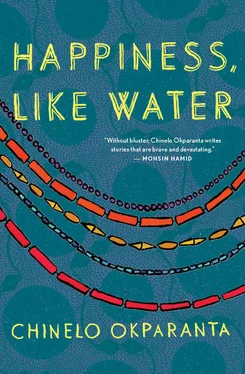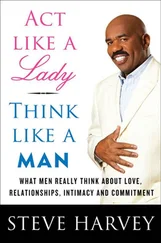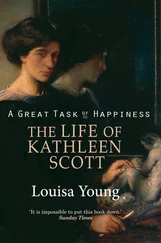First they attached thin wires to her chest and arms with tape. Then the machine beeped and reported the results on a strip of pink graph paper: horizontal lines that peaked and dipped at regular intervals. Perhaps it was her heart after all, I thought. But the electrocardiogram results were normal. Her heart appeared fine.
Next were the X-rays. I waited outside while the nurse took Mama into the room. It was afternoon by the time the results came back. The fluorescent lights had flickered off sometime during our wait, and the fan had slowed to a stop; NEPA had taken away the light.
‘The generator will come on soon,’ the doctor said as he entered the room. In the dim light, he introduced himself. He was charming, tall and young, with a full head of hair. His loafers were black and shone even in the dim light. He was a rheumatologist, he said.
According to the X-ray, the doctor said, there were no fractures in the bone but there were patchy lucencies in the head of the clavicle and destructive changes in it.
Because of the destructive changes, he said, an abscess — a localized fluid collection — had formed in Mama’s shoulder, a sign of infection in the area. He would insert a needle into the area where he was sure the abscess was located and drain it out. Then he would give Mama antibiotics through an IV to help ensure that the infection did not spread. She would have to be admitted to the hospital for all this to be done.
‘You’ll be just fine,’ he said.
‘It’ll be fine,’ I said to Mama, agreeing with the doctor. ‘It’ll be fine.’
I stayed at home with her the weeks after she was discharged, only leaving to run small errands: filling her prescription and stopping by the market to buy the ingredients for pepper soup.
My first day back at UniPort was about a month after Mama’s discharge. I spent most of that day in a daze, not really hearing the lecturers, not taking notes in class. Outside of the lecture halls, I gazed at the other students, the wealthy ones who wore shiny shoes on their feet and, on their ears, tiny Bluetooth headsets — those wireless square buds, barely noticeable from a distance. I watched, transfixed by the way they displayed their wealth, the men swaggering, limping slightly on one leg, as if that leg were weak and dragged — in imitation of the way the American rap stars walked.
The girls had their own kind of swagger. They swayed their hips as they walked, hands dangling limply at their sides, as if they had no care in the world. Their patent leather handbags glistened, only a little less sparkly than the sequins on their stilettos. They drove Hondas and Jeeps. Their cell phones were always ringing, and they’d walk around saying ‘darling’ or ‘sweetheart’, their voices turning more and more saccharine as they spoke. Such good humour must have been from the soothing effect of having so much money, I thought, the effect of having so little to worry about. After all, there were only a few problems in life that money could not fix.
I was sitting on the cement steps of our classroom building when Njideka came to me.
‘Na wetin dey trouble you?’ she asked.
We were in the same government policy class. There were only two of us girls in the class. We would probably not have become friends if not for that. There could have been no two girls as different from each other. For one thing, her weave was always pristine. Sometimes I liked to imagine her head under all that artificial hair. I envisioned bald patches and a thinning hairline, and it was comforting to think that deep down, under all that perfection was a version of her that was just as imperfect as me.
That day, I shook my head and told her that nothing was the matter.
‘Na your Mama?’ she asked.
I did not answer.
She patted me on the shoulder, gently, then began to rub my back. She wore her weave in loose curls that day. They tumbled around her shoulders. A soft wind was blowing and carried in it the scent of her hair conditioner, something floral and welcoming, like the scent of bergamot.
And so, I told her. That Mama was in pain, and the doctors did not know the cause.
‘You need good doctors,’ Njideka said. ‘Private doctors, not those underpaid teaching-hospital doctors who are always going on strike.’
I shook my head bitterly and rolled my eyes at her. We could not even afford the teaching-hospital doctors. How would we afford the private doctors?
‘At the private practices, they’ll have state-of-the-art technology, not that old, broken-down equipment that you find in the teaching hospital. There’ll be electricity, too,’ Njideka said. ‘Generators. No reliance on NEPA, which comes and goes like the wind.’
‘Mama says it’s the curse of the black bird,’ I said. ‘We’ll just stick to praying for now.’
‘Go to the private doctors,’ Njideka said. A command. ‘I know a good one I can refer you to.’
I shook my head. The sun was shining. The wind was stirring up the dust, and not too far from where we sat a light-coloured bird was perching on a branch. If this one would carry a mouse in its mouth and drop the mouse in front of our house, would it also be a curse? Or would its near-whiteness reverse the curse of the black bird?
‘Do you hear me?’ Njideka asked.
I nodded. And I told her honestly that we had no money. That, yes, Papa did have siblings, and although Mama did not have any siblings, she did have cousins. Yes, we even had some distant relatives, but they were all poor like us. Even if Mama or I had asked it of them, none of them would have had the financial means to help with Mama’s visits to the specialists. Not that Mama’s pride would ever allow her to ask it of them.
Njideka’s phone began to vibrate then. She picked it up. ‘Darling,’ she said. Then she cupped the speaker of the phone and whispered to me, in proper English, words impressively articulated, the way I knew she would speak to whomever it was on the phone: ‘I’ll help you out,’ she said. ‘Stop by my place this afternoon. I’ll be home.’
With that she was gone.
I went to her flat after my final class of the day. Mama would not worry. She expected that I’d be late, with having to catch up on so much missed schoolwork.
‘I don’t dash money,’ Njideka said to me. ‘It’s not my style.’
I nodded. Not that I had come expecting that she would dash me the money for Mama’s doctor visit. All the same, in case I ever felt the urge to ask, I now knew better.
Her voice was more vibrant than ever that afternoon. And I latched on to each and every one of her words, her intonations, because there was freedom in them, the way they rang out confidently, without restraint, without worry. Nothing like words between Mama and me.
Her primary patrons were the Yahoo Boys, she told me. They were the ones who rolled into town in sleek cars and with pockets full of cash, even American dollars. I had seen many fancy-looking young men around campus, but I had just assumed that they came from wealth. It had not crossed my mind until that visit with Njideka that many of them built their wealth on Internet fraud.
She also told me about the mugus, the older men, oil executives — often foreigners — overflowing with petro-naira. The mugus didn’t hang around campus but in fancy restaurants and hotels. They bought her jewellery and paid for her recharge cards, sometimes paying as much as twenty thousand naira per month, because, of course, she had more than one phone.
‘It’s not hard work at all,’ she said. ‘Sometimes they just want you to have private dinners with them. Sometimes, they just want to look at and have an intelligent conversation with a pretty woman,’ she said.
Her television was on, and from the corner of my eye I could see the images fluttering across the screen. The room was cool, because the air conditioner was also on. It was not something Mama or I had ever contemplated buying — an air conditioner, let alone a television that took up nearly half the surface of one wall. I had not even thought that such a television existed until I saw it in Njideka’s flat.
Читать дальше












